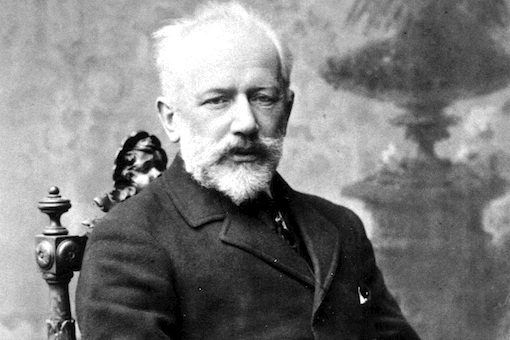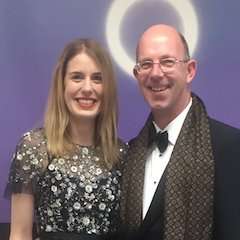Pyotr Ilyich Tchaikovsky was undoubtedly one of the greatest composers, excelling in genres from the symphonic and opera to chamber music and ballet. Many people’s introduction to classical music has been through works like The Nutcracker or the cannonfire of the 1812 Overture. Tchaikovsky’s tortured personality and the need to hide his homosexuality from the world means more is often read into his music than is probably healthy, but he was able to spin melodies like few others. Inspiration never seemed a problem. As the composer wrote, “I sit down to the piano regularly at nine o'clock in the morning and Mesdames les Muses have learned to be on time for that rendezvous.”

Tchaikovsky may have been less than kind about Brahms’ music (they share the same birthday), but when they met, it seems the two composers got on rather well. Tchaikovsky wrote how “Brahms stayed an extra day to hear my [Fifth] Symphony and was very kind… I like his honesty and open-mindedness.” Therefore, it’s only right that the Fifth Symphony should head our playlist of Tchaikovsky’s greatest works.
1Symphony no. 5 in E minor, Op.64
“A complete resignation before fate,” wrote Tchaikovsky in his notebook when sketching out the scenario for his Fifth Symphony. The composer had used a Fate motif in his Fourth, but here it doesn’t hammer; rather it gnaws away at the listener, raising self-doubt and uneasiness. The horn solo in the second movement is a highlight, then, following a lilting waltz, the finale is a titanic struggle for triumph over adversity… even if that victory can be perceived to have something of a hollow ring.
2Eugene Onegin
Pushkin’s novel in verse Eugene Onegin has a special place in Russian hearts – generations still learn it at school. Tchaikovsky’s setting, which he described as “lyric scenes”, is wonderful, particularly the Letter Scene in which the young Tatyana pours out her heart to Onegin, only for him to gently reject her. Years later, the aloof Onegin meets her at a St Petersburg ball and falls head over heels in love. But she is now married to a prince and the tables are turned as she rejects him. It’s an opera that can be painfully moving.
3Symphony no. 6 in B minor, "Pathétique", Op.74
Bleak, desolate, filled with desperation and despair – that’s just a few ways to describe Tchaikovsky’s Sixth and final completed symphony. It premiered in October 1893, only nine days before Tchaikovsky’s death and is hence often tied to his biography, not least because of its unusual form, ending with a long, slow movement which fades into nothing. It stares deep into the abyss and, with the right performance, stares into the void.
4Violin Concerto in D major, Op.35
After a failed suicide attempt following the failure of his disastrous marriage, Tchaikovsky recuperated in Switzerland. He was visited by a young pupil, violinist Iosif Kotek, who inspired Tchaikovsky to compose a concerto which was so fiendishly difficult that its dedicatee, Leopold Auer, declared it unplayable. It wasn’t until two years later that Adolf Brodsky persuaded Hans Richter to play it with the Vienna Philharmonic, but the under-rehearsed premiere went badly. Eduard Hanslick described the concerto as music “whose stink one can hear”. Thankfully, it was later recognised for the masterpiece it is.
5Piano Concerto no. 1 in B flat minor, Op.23
Everyone recognises the opening brass salvoes and the first bold chords of the piano in Tchaikovsky’s concerto. Although you can find it on almost every orchestra’s programme at least once a season, it very rarely feels tired and there are always new things to discover and to fall in love with. Charming woodwind solos, vigorous piano cadenzas, the galloping finale… lean back and bask in the balm of a true masterpiece.
6Swan Lake
It’s strange to think that Swan Lake – probably the most famous ballet in the world – was not a big hit when it premiered in 1877, although Tchaikovsky’s score earned praise. It wasn’t until after the composer’s death that the ballet's fortunes turned when choreographers Marius Petipa and Lev Ivanov collaborated on a revival for St Petersburg’s Imperial Ballet. It’s “White Scene” of lakeside swans in Act 2 has become iconic, technically demanding but with lines of great purity.
7String Sextet in D minor "Souvenir de Florence", Op.70
“Now I am terribly, indescribably tired!!!” Tchaikovsky exclaimed after completing his opera The Queen of Spades in just over four months, three of which he had spent in Florence, “and what do I need now to get me back to normal? To enjoy myself, to go on the binge?” He decided to write a completely different kind of work: a string sextet. It bursts with sunlight and warmth and the finale is full of bouncing folk melodies. No wonder Tchaikovsky admitted, “It is terrible how thrilled I am with my own work…”
8Les Saisons (The Seasons) for piano, Op.37a or Op.37b
Tchaikovsky was commissioned to write his twelve short pieces for solo piano by Nikolay Matveyevich Bernard, editor of the Russian musical-theatrical journal Nuvellist, to be published successively throughout the year. Each piece was given a subtitle and an accompanying verse that sensitively matched words to music or music to words as it’s not clear how much say Tchaikovsky had in the choice of texts. Best known are certainly the lilting June (Barcarolle) and the snowy November (Troika), highly praised and loved by Rachmaninov.
9Net, tol'ko tot, kto znal (None but the lonely heart), Op.6 no.6
Tchaikovsky composed many songs, but his most famous comes from his early Op.6 collection and is a setting (albeit in translation) of Goethe’s Nur wer die Sehnsucht kennt. It’s set to a gorgeous, yearning melody and has been a favourite recital staple of many singers… including Frank Sinatra!
101812 Overture, Op.49
Cannons, ringing chimes, brass fanfares, The Year 1812 Solemn Overture is a true showstopper and probably one of the first Tchaikovsky works one encounters. It was written to commemorate the Russian victory over Napoleon's invading Grand Armée in 1812. It opens with a prayerful Eastern Orthodox Troparion before the invading La Marseillaise – although Napoleon banned it as the French anthem in 1805 and it was only reinstated in 1879 – is fought with Russian folk music and cannon shots. It culminates with the melody of God Save the Tsar!, the Russian national anthem from 1833 to 1917.


